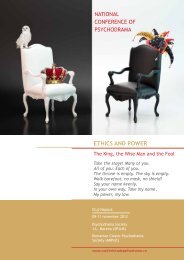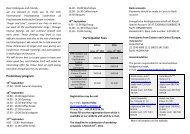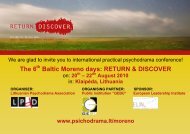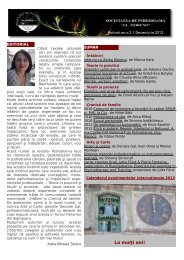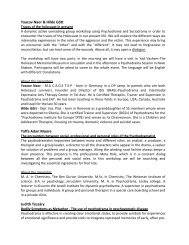Newsletter 2010-11 this is the one - Psychodrama Institut für Europa
Newsletter 2010-11 this is the one - Psychodrama Institut für Europa
Newsletter 2010-11 this is the one - Psychodrama Institut für Europa
Create successful ePaper yourself
Turn your PDF publications into a flip-book with our unique Google optimized e-Paper software.
<strong>Newsletter</strong> <strong>für</strong> alle Mitglieder des PIfE /<strong>Newsletter</strong> to all PIfE members - <strong>2010</strong>/20<strong>11</strong> -<br />
3<br />
But not only re- and d<strong>is</strong>covered ideas made <strong>the</strong>se sixth<br />
Baltic Moreno days such an amazing experience. Also a<br />
great organ<strong>is</strong>ation, an impressing sunset on <strong>the</strong> sea, an art<br />
and culture centre as a formidable conference site and a<br />
party with Lithuanian folk dances and wonderful people<br />
helped to make up a creative, happy and fruitful time.<br />
Many thanks to <strong>the</strong> Lithuanian <strong>Psychodrama</strong> Association<br />
and to <strong>the</strong>ir president Daiva Rudokaitė!<br />
Chr<strong>is</strong>toph Hutter<br />
Das Sommerseminar <strong>2010</strong><br />
Das Sommerseminar <strong>2010</strong> <strong>is</strong>t einerseits aus dem Konzept<br />
der Sommerakademie hervorgegangen und andererseits aus<br />
der inhaltlichen Arbeit von Yaacov Naor und Hilde Gött<br />
entstanden, die zusammen seit Jahren einen Dialog zw<strong>is</strong>chen<br />
Juden und deutschen Nichtjuden der Nachkriegsgenerati<strong>one</strong>n<br />
schaffen. Im Folgenden werde ich diese Entwicklung<br />
kurz skizzieren:<br />
Im Sommer 2000 fand eine Sommerakademie in<br />
Gârda/Transylvanien statt, die eine M<strong>is</strong>chung von Seminar,<br />
Freizeit, Abenteuer, Kultur war. Inhaltlich ging es um Land<br />
und Leute, Sagen und My<strong>the</strong>n und die Unterbringung war<br />
auf Bauernhöfen oder in Zelten. 2006 hat die zweite Sommerakademie<br />
mit ähnlichem Konzept auf Kreta stattgefunden.<br />
Auch hier waren die My<strong>the</strong>n, Sagen und Traditi<strong>one</strong>n,<br />
die in der modernen Welt vom Untergang bedroht sind, die<br />
Themen. Die Workshops wurden auf den Klippen, im Cafenion<br />
oder im Olivenhain gehalten und die Teilnehmer wohnten<br />
in einer Orthodoxen Bildungsstätte.<br />
Im Sommer 2008 fand die Sommerakademie in Krakow und<br />
Auschwitz statt, diesmal mit einem veränderten Konzept.<br />
Um dem Thema „Spuren des Holocaust in der Gegenwart“<br />
gerecht zu werden, wurden nicht wie b<strong>is</strong>lang mehrere<br />
Workshops angeboten, sondern nur einer. Damit sollte ein<br />
kontinuierlicher Prozess eingeleitet werden, um einen psychodramat<strong>is</strong>chen<br />
Raum <strong>für</strong> die Begegnung zw<strong>is</strong>chen Juden<br />
und Nichtjuden aus den unterschiedlichen Ländern zu<br />
schaffen und einen neuen Umgang miteinander möglich<br />
machen, der im brüchigen <strong>Europa</strong> nach dem Zweiten Weltkrieg<br />
lange nicht denkbar schien.<br />
Diese inhaltliche Seminararbeit hat sich bewährt und sollte<br />
deshalb auch beibehalten werden. Doch der Titel „Sommerakademie“<br />
<strong>is</strong>t anders besetzt: Dieser Name soll Projekten<br />
vorbehalten bleiben, die Freizeit, Abenteuer und das Kennenlernen<br />
von Land &Leuten zum Ziel haben und die Möglichkeit<br />
bieten, auch Teilnehmer aus fernen Mitgliedslän-<br />
The Summer Seminar <strong>2010</strong><br />
The summer seminar <strong>2010</strong> was based both on <strong>the</strong> concept<br />
of <strong>the</strong> summer academy and on <strong>the</strong> work of Yaacov Naor<br />
and Hilde Gött, who for some years have worked toge<strong>the</strong>r<br />
to try and develop a dialog between Jews and German non-<br />
Jews of <strong>the</strong> post-war generations. In <strong>the</strong> following I will<br />
briefly outline <strong>th<strong>is</strong></strong> work:<br />
In summer 2000 a summer academy took place in<br />
Gârda/Transylvania, which was a mixture of seminar, le<strong>is</strong>ure,<br />
adventure and culture. The <strong>the</strong>mes and topics were<br />
nations, people, legends and myths. The participants were<br />
accommodated on farms or in tents.In 2006 <strong>the</strong> second<br />
summer academy with a similar concept took place on<br />
Crete. The legends, myths and traditions which are in decline<br />
in <strong>the</strong> modern world, were also <strong>the</strong> topics <strong>the</strong>re. The<br />
workshops were held on <strong>the</strong> cliffs, in cafes or in olive<br />
groves and <strong>the</strong> participants were accommodated in an orthodox<br />
college of education.<br />
In summer 2008 <strong>the</strong> summer academy took place in Krakow<br />
and Auschwitz, <strong>th<strong>is</strong></strong> time with a changed concept. In<br />
order to do justice to <strong>the</strong> <strong>the</strong>me "Traces of <strong>the</strong> Holocaust in<br />
<strong>the</strong> Present" only <strong>one</strong> workshop was presented, where previously<br />
several workshops had been offered. In <strong>th<strong>is</strong></strong> way a<br />
continuous process could be started which would help create<br />
a psychodrama space where encounters and contact<br />
between Jews and non Jews from different countries could<br />
take place, which for a long time had seemed impossible in<br />
fragile post-war Europe.<br />
Th<strong>is</strong> ideas and content of <strong>the</strong> seminar have proven to be<br />
particularly valuable and <strong>the</strong> seminar should be continued.<br />
However <strong>the</strong> title "summer academy" has ano<strong>the</strong>r sense:<br />
i.e. projects which focus on adventure, le<strong>is</strong>ure, learning<br />
about countries and people and which also encourage <strong>the</strong><br />
participation of people from d<strong>is</strong>tant member countries and<br />
remote areas.<br />
<strong>Psychodrama</strong>-<strong>Institut</strong> <strong>für</strong> <strong>Europa</strong> e.V., Einemstr. 14, 10785 Berlin, Germany<br />
Fon: 0049.30.2629860, Fax: 0049. 30. 25794340, e-mail: pife.europa@t-online.de<br />
Bankkonto/banc account: Nr. 803278, Ev. Darlehnsgenossenschaft, Kassel (BLZ/banc code 52060410)<br />
BIC: GENODEF1EK1, IBAN: 53520604100000803278<br />
Vorstand/Board: H. Gött- Chairwoman (Germany), E.Verdú (Norway), Dr. J. Hardy (Hungary), F. Dorn (Germany),<br />
Dr. S. Birle (Romania), Dr. C. Hutter (Germany), A. Bielanska (Poland), www.pife-europe.eu



